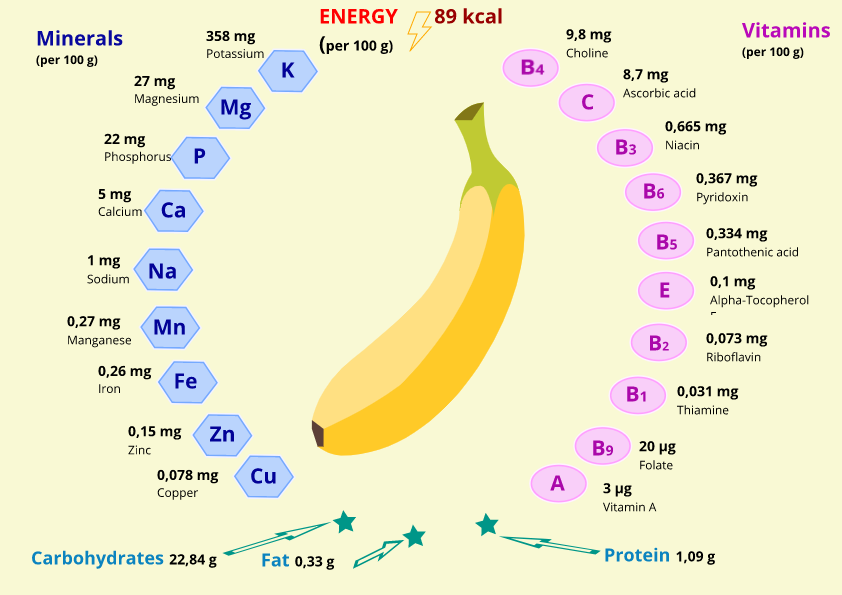Bananas are among the most important crops on our planet. They are a healthy source of fiber, potassium, vitamin B6, vitamin C and various antioxidants and phytonutrients. At the same time, they are an excellent source of energy.

Carbohydrates
Bananas are a rich source of carbohydrates, which are mainly present in the form of starch in unripe bananas and sugars in ripe. The composition of carbohydrates changes dramatically during maturation. Unripe bananas contain up to 80% starch in the dry matter. During ripening, the starch turns into sugars and a fully ripe banana contains only 1%. The most common types of sugars in ripe bananas are sucrose, fructose and glucose, which together can make up more than 16% of fresh weight.
Bananas have a relatively low glycemic index (GI) with values of 42-58, depending on the degree of ripeness. It expresses how quickly carbohydrates increase the value of your blood sugar.
Fiber
Immature bananas contain a high percentage of resistant starch that your digestive system cannot digest. Since ripe bananas contain only about 1% starch, they do not cause any difficulty in digestion. On the contrary, in your colon, this starch is converted by fermentation of bacteria into compounds that appear to have a beneficial effect on the health of your intestines.
Bananas are also a good source of another type of fiber – pectin, part of which is soluble in water. Its content is one of the main reasons why bananas soften when ripened.
Potassium
Nutrition based on a high potassium content can lead to a reduction in blood pressure for people with higher potassium levels and has a positive effect on heart health. It also affects the proper function of the kidneys.
Vitamin B6
One average size banana can provide up to 33% of the daily recommended value of this vitamin. This is great especially during pregnancy because it affects the development of the baby’s central nervous system. It also helps transport oxygen to tissues through hemoglobin. The recommended daily dose of vitamin B6 for pregnant women is 1.9 mg, so one medium-sized banana contains approximately 21% of the recommended daily intake.
Vitamin C
Like most fruits, bananas are a rich source of vitamin C.
Iron
Bananas contain a high proportion of iron, which has the ability to stimulate the production of red blood pigment – hemoglobin. Therefore, if you suffer from anemia, be sure not to avoid bananas! They serve as one of the natural stores of iron, which does not burden your stomach as it does in the case of pills.
Recent Comments